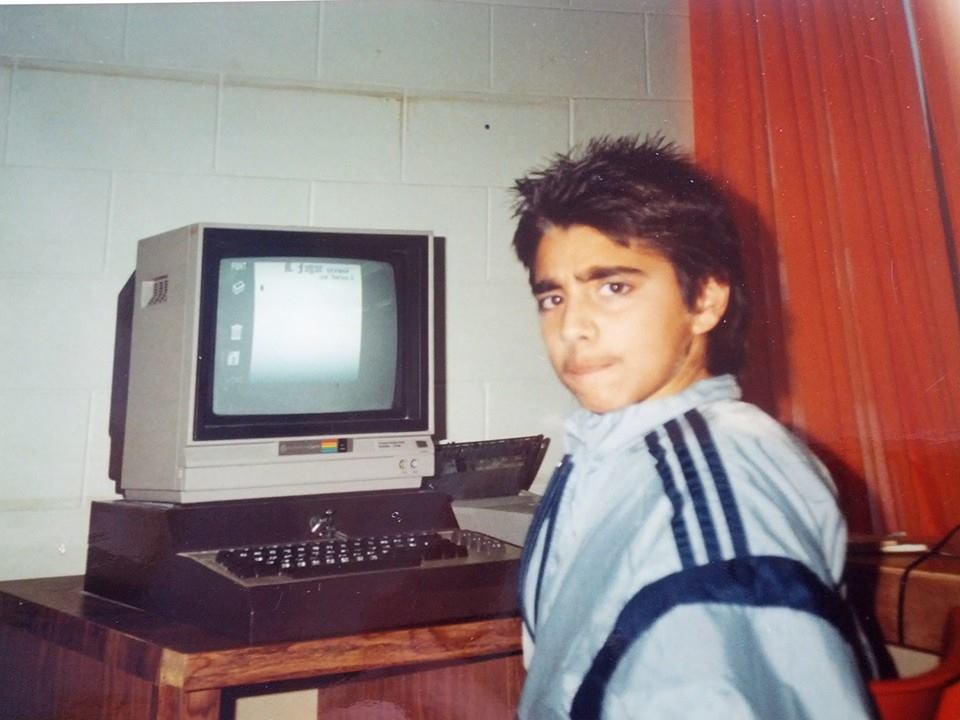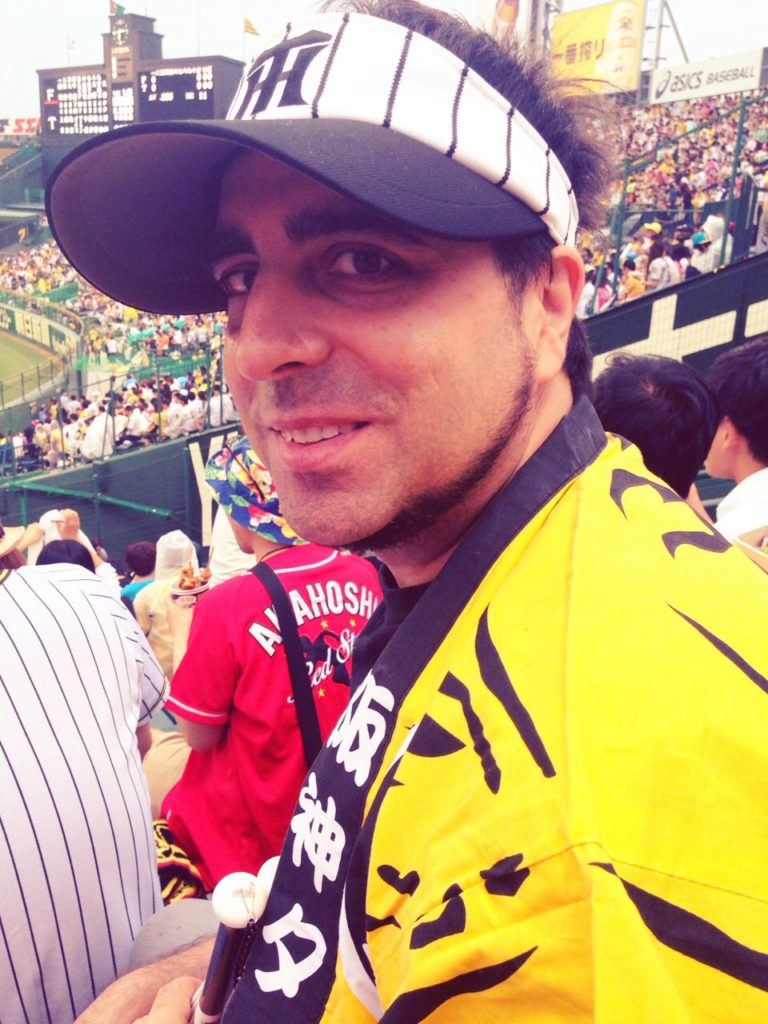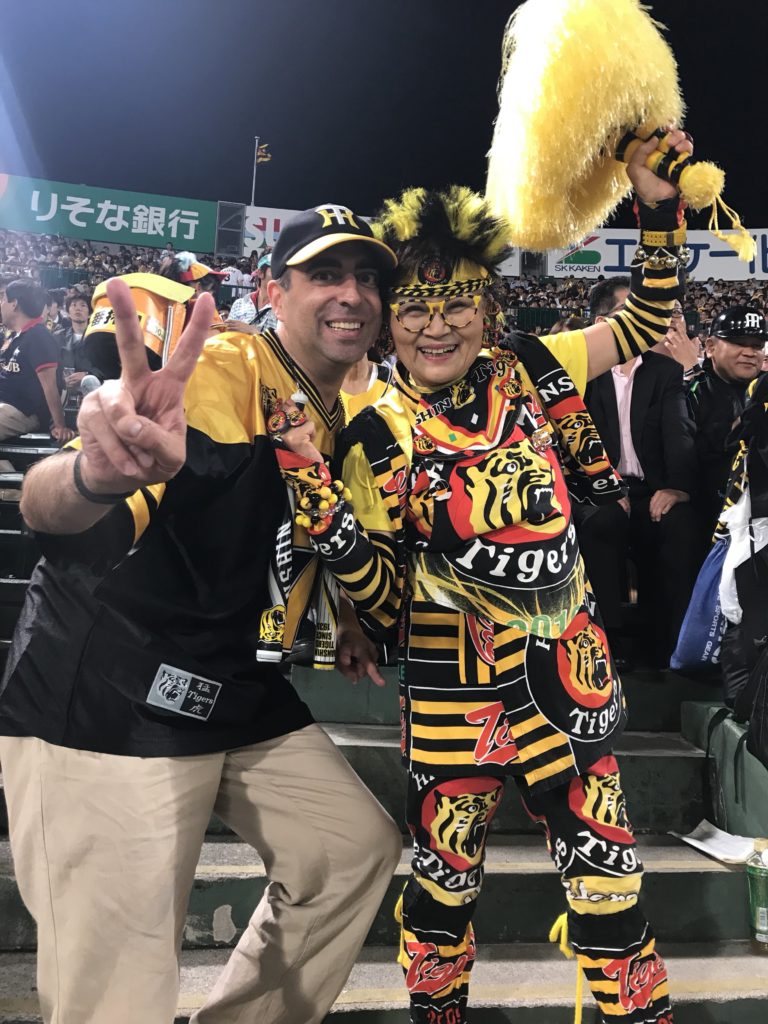No one knows better than Trevor Raichura that you can’t always predict just what is coming down the pike.
After all, the JapanBall News Correspondent has lived and worked in Japan as a teacher for two decades even though, in the beginning, living even two years abroad seemed like a stretch to him.
Later, a routine flight back to Japan after visiting family in Canada turned non-routine when he met the woman he eventually married.
And, long after dropping his collegiate journalism studies, he found himself back in the game as a writer, podcaster, and founder of a popular Japanese baseball website. On top of that, he was a wedding officiant for several years – a gig that even landed him a cameo in a Japanese movie.
None of which Raichura ever envisioned while growing up in Winnipeg, Manitoba.
“When I was young, I didn’t imagine myself being somewhere else in the world,” he agreed, “and I certainly hadn’t given a thought to living overseas. I didn’t have any interest in Japan, even after I first got here.”
“I just knew I hated the winters in Winnipeg,” he added with a laugh.
Raichura grew up following hockey – what kid in Canada doesn’t? – as a fan of the Winnipeg Jets, and also paid attention to other sports, including baseball. His mother, Neta Boychuk, says that at around age seven, Trevor and a friend would watch games with the sound muted and do the play-by-play and commentary themselves.
“He learned to read early on, too,” she said. “He’d grab the sports pages every morning when the newspaper came. He’d read the scores and other statistics, and that helped him learn his multiplication tables.”

Trevor went through high school with the goal of becoming a sports journalist and began college in Ottawa as a journalism major. However, he decided after a year to give that up in favor of education.
“It was a combination of things – a three-headed monster,” he said. “I was on a partial scholarship, and you had to have at least an A- average your first year to keep it. I barely missed that, so I was going to have to pay for room and board my second year.
Also, I was told that the second year of journalism school would mean 80 hours a week of work and study. I don’t know if that was really true, but it seemed like too much.”
“And, third, it seemed like journalism was a cutthroat business. I don’t like to step on someone else to get into the middle of a scrum – at least, that’s the way I felt when I was 19.”
Thus, his diversion into the world of education that eventually routed him to Japan.
Japan first entered Raichura’s life after graduating from the University of Manitoba in 1998.
Teaching jobs weren’t plentiful, so he signed on with the Japanese government’s JET program to get overseas experience. He was assigned to Okinawa as an assistant English teacher.
“There were a lot of issues – particularly the language barrier – but as I got into my first year in Japan, I started liking it. I really loved Okinawa. I got a real warmth from the people, and that went a long way toward smoothing the transition,” he said. “I knew part of the way into my first year that I wanted to come back for a second.”
He later taught in an American school in Okinawa, went back to Canada for a year, and then returned to Okinawa, where he worked until 2010. At that point, he moved to Hokkaido to work with a new church, and that’s where he began working on the side as a wedding officiant. He did that off and on until 2018.
“It was really fun,” Trevor said. “I worked with a guy who did it two days a week, and he would give me his overflow.
Most of the officiants are foreigners because many couples want Western-style weddings. If it was a 2pm wedding, you’d go in at one, go through it beforehand with the couple, and then do the actual wedding. Then you’d either move on to the next wedding or go home.
“Once, I dropped one of the rings during the ceremony, and I thought I was going to get fired . . . but no one complained,” he said with a laugh.
Since then, he’s been an English instructor at multiple levels – currently at the Osaka campus of Ritsumeikan University – but the circle back toward journalism began when he was commissioner of a fantasy baseball league and wrote newsletters and season-ending analyses.
“One of my friends said, ‘ESPN is missing out . . . They need you on staff.’”
Instead, he next staffed his blog and website devoted to the Hanshin Tigers.
“It was kind of a distraction from work, which I wasn’t enjoying then,” he said. “It wasn’t an issue with the school. I’d just done the job for a long time and was kind of bored with it. A friend who’s a career coach asked me what my passion was, and I told him about wanting to be a sports journalist, and he suggested I start a blog.
I’d gotten to be a fan of the Hanshin Tigers, so I started a blog on them.”

“I quit my teaching job the next year and was prepared to go freelance, but I found a job at a university that I could do and still have time for the blog.”
The blog first appeared in 2014 and has steadily attracted more visibility, even reaching a fan and soon-to-be friend in Brazil. Fernando Zornoff, a graphic designer from Sao Paolo, had gotten into baseball at a young age, thanks to the large Japanese community where he grew up – “When I was ten, my coach wore a Seibu Lions cap. I’ve never forgotten that cap.”
Zornoff started digging to learn more about Japanese baseball and became aware of Hanshin and its rivalry with the Yomiuri Giants – “like the Yankees and the Red Sox.”
Now living in Dubai, he was always looking for information about the Tigers, which is difficult to find in English. Then he discovered Trevor’s website, which was pretty new at the time.
“I reached out to him – said I was a graphic designer and asked if I could do something to enhance his site visually. He said yes, and we’ve been friends ever since. We talk pretty much every day. There aren’t many people in Dubai I can talk baseball with. Sometimes, I think I talk to him more than my wife,” Zornoff said with a chuckle.
As Raichura’s blog received increased visibility, it eventually helped him land a gig with the Daily Sports newspaper in Kobe. He writes a monthly column that focuses primarily on his experiences as a foreigner cheering for the Tigers.
He also started working with JapanBall several years ago. He began writing a bi-weekly newsletter about Japanese baseball – primarily about the NPB – in 2017 and has also acted as an assistant tour guide when JapanBall’s group is in the area near his current hometown of Nishinomiya, Hyogo.
“I’d reached out to [JapanBall founder] Bob [Bavasi] maybe a year before,” Raichura recounted, “and asked him if he needed any help with tours. At the time, the answer was ‘no,’ and I figured that was it. But September rolled around, and Bob got in touch and said they had an extra ticket for a game in Osaka.
“So I went, hung out, and interacted with people. As we were walking back to the train station, Bob said, ‘Do you realize what you did in there?’ I wasn’t sure if that was positive or not, but he said, ‘You talked to everyone and answered all the questions.’”
Bavasi remembers it well.
“As we were going to the game, I was with a guy named Paul Barnes, who is in our Hall of Fame. He said that he knew Trevor, followed his blog, and that he really knew his stuff.
“Trevor was very engaging, and people really liked chatting with him. At one point, we were watching the game, and a person that had left for a while came back to his seat. Trevor told him what every batter that inning had done, so it was clear that he was paying attention to the game while talking to me. And I remember after another game that we ran into some of the Tiger players in the train station, and they said hello to him, which showed the sort of connections he’d made.”

So, given his skills and experience, what does the future look like for Raichura? More teaching? More journalism? A combination of both, perhaps? Something else could get into the mix, too.
“It’s hard to say,” he agreed. “I really like doing stuff for JapanBall, and I love doing the blog on the Tigers. But I’m always up for doing more.”
His mom believes that “he’d go into journalism if he could make a living at it.”
Rob Wunderlich, another friend from Raichura’s days in Okinawa, said, “Trevor could do a lot of things. He’s a natural teacher, and he’s a good writer, too – skills that can take someone in many directions. His Japanese is perfect, which is a real asset. He can even do the characters really well. Usually, if guys can fit in in Japan, they stay.”
Raichura has seven- and four-year-old sons, and it’s nice that his work with JapanBall and his blog don’t require him to leave the house, though he goes to games as often as possible.
Several years ago, he noticed a job opening as an interpreter for the Hanshin club, but he eventually didn’t pursue it because it would have meant a lot of time away from his family.
“At first, I thought, ‘What a great job!’” he said. “But then I talked to a couple of players and their wives about it, and I realized how many road games there would be, plus the 30 spring training games and playoffs.
Interpreters get to the ballpark before the players do and are there until 11pm or midnight. And any time a player or his family needs something, you’re on.”
Still, there are possibilities.
“I recently interviewed one of the current players,” he said, “and I feel that if it gets onto the radar of the right person, it might become something more.
“I’d also like to write a book in English about the history of the Tigers and how some of the foreigners have influenced the organization over the years. I’ve interviewed some from the 1960s and ‘70s so far. At this point, though, it seems like a daunting task,” he said with a nervous laugh. “I sit at my computer and wonder, ‘How can I start this?’”
“But it’ll happen.”

